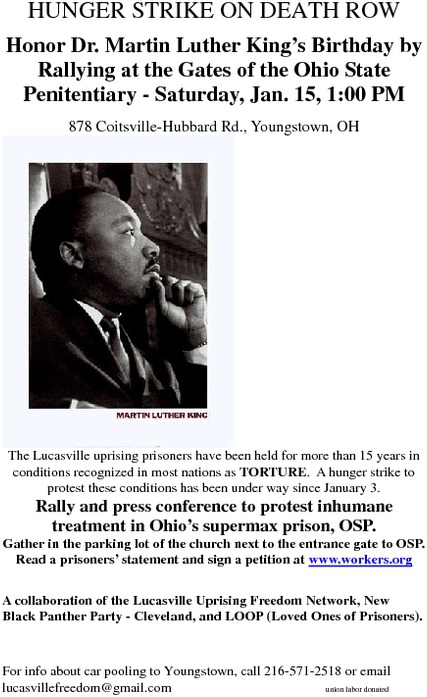Support the Lucasville Five
From: Lucasville Five lucasvillefive@gmail.com Denis O'Hearn 6:30pm Feb 17
A LETTER TO SUPPORTERS OF THE LUCASVILLE FIVE: PLEASE READ, RESPOND,
AND PASS ON TO AS MANY PEOPLE AS YOU CAN
Dear supporter, or potential supporter, of the five men sentenced to
death for their leadership roles in the Easter uprising of prisoners
at Lucasville in 1993:
First of all, thanks. When we visited the men on hunger strike at the
Ohio supermaximum security prison in January, each brought to the
visit a stack of letters from supporters all over the world. They are
emphatic that it was this outpouring of support that caused Ohio
authorities to take major steps toward equalizing conditions of
confinement for all death-sentenced men at the Ohio State Penitentiary.
Now we move on, redirecting energy to the underlying threat of
execution. Each of these prisoners ? Siddique Abdullah Hasan, Jason
Robb, Bomani Shakur (also known as Keith LaMar), George Skatzes, and
Namir Abdul Mateen (also known as James Were) ? is in the early
stages of appeal in federal courts. They can expect to live several
years before they are killed. We must help them use that time.
Ohio was the only state with more executions in 2010 that in 2009.
Second only to Texas, Ohio was the state with the greatest number of
executions in 2010. Ohio has already scheduled nine executions in
2011, one a month from February through October.
However, since the successful end to the January hunger strike, there
has been another spectacular happening in Ohio. The most senior
justice of the Ohio Supreme Court who helped to draft the state's
capital punishment law (Paul Pfeifer), a recent director of the state
prison system who witnessed 33 Ohio executions (Terry Collins), and
ten Catholic bishops including the bishops in Cincinnati (location of
the Lucasville Special Prosecutor and site of major Lucasville
trials) and Youngstown (where four of the five leaders of the 1993
rebellion are housed) have all come out against the death penalty.
Here are some of the things they say.
Justice Pfeifer: "[O]ver the years, the death penalty has come to be
applied more pervasively than we ever intended. We also wanted a
review process implemented in which the Ohio Supreme Court, in
addition to considering death penalty appeals, would monitor death
sentences across the state to verify that they were being evenly and
fairly applied. Simply put, that hasn't happened."
Former Director Collins: "I personally observed the execution of 33
men from 2001 to 2010. All 33 times, in the back of my mind I
questioned: Had all the reviews and appeals got this case right?...I
wondered that because I had previously walked people out of prison
who were found not guilty after years of incarceration. What if we
got it wrong for those we executed??[W]e continue to be one of the
few industrialized nations to carry out the death penalty when we
know mistakes happen."
Catholic Bishops: "The Catholic Bishops of Ohio agree with recent
comments made by both Ohio Supreme Court Justice Paul Pfeifer and
former Ohio Department of Rehabilitation and Correction Director
Terry Collins that Ohio's elected legislative leaders ought to debate
and ultimately abolish the death penalty."
Here are three facts with which the Lucasville prosecutors would agree.
1. There was no DNA evidence, there was no physical evidence that
permitted the state to connect a particular prisoner with any of the
ten murders.
2. Therefore, the prosecutors relied on the testimony of prisoners
many of whom received benefits (no indictment, reduced charges,
concurrent sentences, early parole) in return for their cooperation
with the prosecution.
3. The five men sentenced to death were convicted primarily on the
basis of their leadership roles. The state still does not know for
sure who actually strangled hostage officer Robert Vallandingham.
If you would find it helpful to know more about the factual details,
a new edition (with Foreword by Mumia Abu Jamal) of Lucasville by
Staughton Lynd can be ordered from PM Press,
What can we do?
We have been advised that the most effective form of communication is
individual letters. Here are the names and addresses of key persons
to whom you can write about the following issues:
* Because there is grave doubt about the evidence used to convict
prisoners involved in the Lucasville rebellion, an amnesty should be
declared as in New York after the uprising at Attica;
* In light of increasing doubts about whether the death penalty
can ever be fairly implemented, it is time to end capital punishment in Ohio.
Please write to:
Governor John Kasich,
Gary Mohr, Director, Ohio Department of Rehabilitation and
Correction,
Gary.Mohr@odrc.
State Representative Ted Celeste, who according to the Associated
Press hopes to introduce "legislation aimed at abolishing the death
penalty in Ohio," district24@ohr.
Finally, so that we can stay in touch with your efforts on behalf of
the five men and all others on Ohio's Death Row, please forward
copies of your e-mails to lucasvillefive@gmail.com.
Yours in hope,
Jackie Bowers Dwight LaMar Staughton Lynd
sister of George Skatzes uncle of Bomani Shakur author, Lucasville
Denis O'Hearn
author, Bobby Sands, the Irish Hunger Striker who Ignited a Generation





